|
|
|
Sort Order |
|
|
|
Items / Page
|
|
|
|
|
|
|
| Srl | Item |
| 1 |
ID:
099780
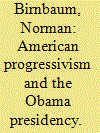

|
|
|
|
|
| Summary/Abstract |
US progressivism is half espoused, half rejected, by an ambivalent if talented President. The Republican image of the President as 'socialist' is one which the social democratic Democrats wish were true. The President's readiness to compromise has not tempered the extreme hostility of the Republicans. It has been exploited by the political agents of business and finance. It has used by the permanent war party: the campaign against 'terror' enables it to retain mastery of foreign and military policy. The New Deal's heirs, seeking more social democracy and less militarism, are bereft of new forms of political action. US democracy is threatened by an eruption of cultural and religious fundamentalism, racism, and xenophobia, as well as a compulsive refusal of social solidarity. Withal, the situation is open as well as complex, and the President in the long run may be much more successful than his angry detractors and disappointed supporters allow.
|
|
|
|
|
|
|
|
|
|
|
|
|
|
|
|
| 2 |
ID:
099781
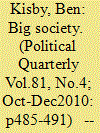

|
|
|
|
|
| Publication |
2010.
|
| Summary/Abstract |
The Prime Minister, David Cameron, recently set out his vision of a 'big society'. Its core themes are empowering communities, redistributing power from the state to citizens and promoting a culture of volunteering. The idea is badly flawed. It overlooks the crucial role that needs to be played by the state in promoting social justice, which is vital to the development of active citizenship and vibrant communities. Moreover, Cameron views the active citizen as simply a philanthropist and volunteer rather than as a politically literate individual, knowledgeable about the major political issues of the day and actively involved in debates about how public or private services ought to be run. The initiative is particularly perverse in the context of the credit crunch, a vitally important cause of which was precisely not the development of an over-mighty state but rather the inadequate state regulation of free market trading activities by banks.
|
|
|
|
|
|
|
|
|
|
|
|
|
|
|
|
| 3 |
ID:
099782
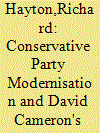

|
|
|
|
|
| Summary/Abstract |
A key feature of David Cameron's electoral appeal is his carefully cultivated image as a 'family man'. Cameron has repeatedly stressed the importance of the family to his political views and stated his desire to see marriage rewarded through the tax system. At the same time, Cameron has presented himself as a modernising leader, keen to demonstrate that he and his party are in touch with contemporary society. Central to this effort to detoxify the Conservative brand has been an emphasis on social liberalism. The potential conflict between these two objectives reflects the division in the party between social liberals and traditionalists, which has become increasingly apparent over the past decade. This article examines Conservative party policy and rhetoric on social and moral issues since 1997, particularly gay rights and family policy. It notes that a significant divide remains in the Conservative party between social liberals and traditionalists, so in this respect Cameron's modernisation project remains far from complete
|
|
|
|
|
|
|
|
|
|
|
|
|
|
|
|
| 4 |
ID:
099784
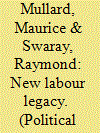

|
|
|
|
|
| Summary/Abstract |
The election of the Conservative-Liberal coalition in May 2010 provides the opportunity to start to map out the record of the Labour governments between 1997 and 2010. This paper deals with the specific question how the Brown/Blair governments performed on public expenditures when compared to the records of UK Labour governments since 1945. Did the public expenditure record of the 1997 represent a departure from that of previous Labour governments? This is important to ascertain since there are strongly held beliefs that New Labour was not committed to Labour's historic commitments of income redistribution and universal benefits. The analysis that follows is constructed around five major public expenditure programmes that reflect Labour's priorities. These include total expenditure, expenditure on health, education, housing and social security.
|
|
|
|
|
|
|
|
|
|
|
|
|
|
|
|
| 5 |
ID:
099783
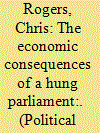

|
|
|
|
|
| Summary/Abstract |
The British general election on 10 May 2010 delivered Britain's first hung Parliament since February 1974, and in the run-up, the Conservative party made much of the economic difficulties Britain faced in the second half of the 1970s in order to try and convince voters that anything other than a Tory vote would risk exposing the nation to the discipline of financial markets. The question of how well equipped an exceptional kind of British government is to deal with exceptional economic circumstances is therefore of paramount importance. This paper argues that the Conservative party made too much of the impact of the 1974 hung Parliament in precipitating subsequent economic crisis and suggests that as such, there is no reason to assume that the Conservative-Liberal coalition government is ill-equipped to manage British economic affairs in difficult circumstances.
|
|
|
|
|
|
|
|
|
|
|
|
|
|
|
|
| 6 |
ID:
099785
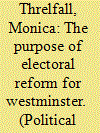

|
|
|
|
|
| Summary/Abstract |
Britain is facing a referendum on electoral reform for Westminster in 2011, yet there is little debate over the goals of such a change. Arguably, the purposes of political representation should determine the choice of a new system. Thus, ten modernising goals that go further than merely giving more seats to the Liberal Democrats are proposed. In a society made up of women and men, both need balanced representation. In an educated society, citizens need to be kept abreast of their MPs' performance as legislators so they can engage with parliamentary affairs. In an increasingly diverse society, the electoral system needs to improve who gets to be represented by whom, by providing citizens with more than one representative per district. The proposed Alternative Vote would provide few advantages and additional drawbacks, but could stimulate consensus around a modern system in tune with Westminster traditions.
|
|
|
|
|
|
|
|
|
|
|
|
|
|
|
|
|
|
|
|
|